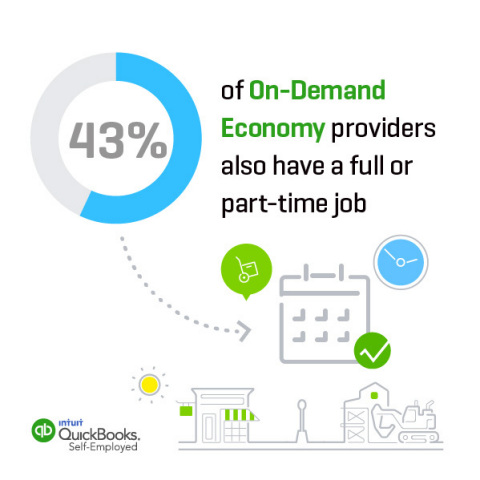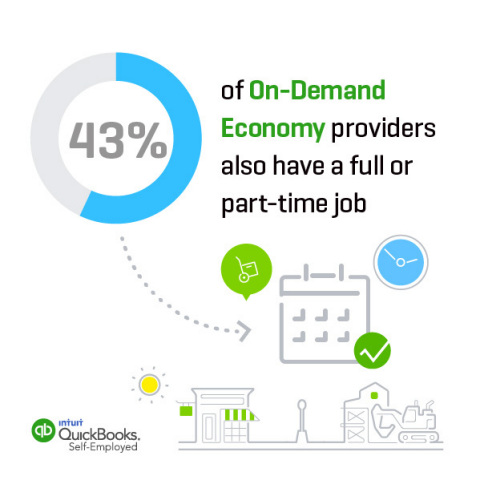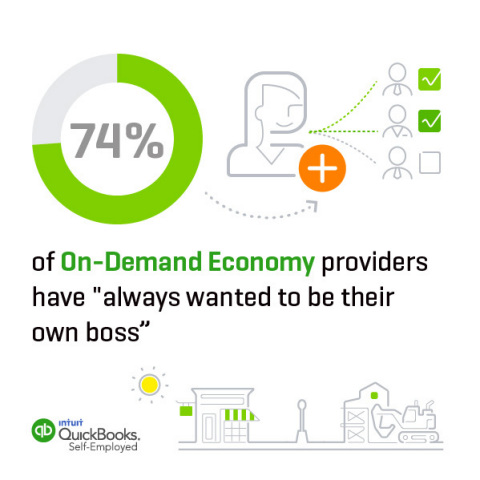MOUNTAIN VIEW, Calif.--(BUSINESS WIRE)--The 40-hour work week may be alive and well, but it looks nothing like it did a generation ago – at least not if you’re part of the growing ranks of people dipping a toe in the on-demand economy.
A new study from Intuit Inc., “Dispatches from the New Economy: The On-Demand Workforce,” shows that on-demand economy workers average 40.4 hours per week, but rely on three different sources of income to make up their entire paycheck. The typical work week includes a mixture of: on-demand work (34 percent), a traditional full or part-time job (30 percent), contracting and consulting (19 percent), and running a business (14 percent).
The new data comes from a study from Intuit Inc. (Nasdaq: INTU) and Emergent Research that examined people working via eleven on-demand economy and online talent marketplace companies. Study participants included: Deliv, Field Nation, Fiverr, HourlyNerd, MBO Partners, OnForce, Uber, Upwork (formerly Elance-oDesk), Visually, Wonolo, and Work Market.
“The on-demand economy is reshaping the way people earn a living, take control of their careers and support their families. From drivers, to designers, to management consultants – people have more opportunities than ever to supplement existing income streams or to take the leap into being their own boss,” said Alex Chriss, vice president and general manager of Self-Employed Solutions at Intuit. “But we must also recognize the shadows that have emerged. The benefits infrastructure of a generation ago was not built to accommodate the reality of work today. At Intuit, we’re committed to building new solutions that deliver certainty and stability for self-employed people who are stitching together different income streams.”
On-demand Work Supplements Existing Income
The study shows that the on-demand economy is playing a unique role in the labor market by providing people with flexible opportunities to augment their existing work:
- 63 percent of on-demand workers indicate that “the primary reason I work in the on-demand economy is to supplement my income.”
-
Other primary reasons for working in the on-demand economy include:
- “Creating and controlling my schedule” (46 percent)
- “A desire for greater work/life flexibility” (35 percent)
- “Being my own boss” (32 percent)
- Only 11 percent reported turning to on-demand work “because of an inability to find a job.”
High Satisfaction With On-demand Work
The study found that most people working in the on-demand economy are satisfied, while key challenges focus on finding enough predictable work.
- 91 percent of people working on-demand jobs report that they like controlling decisions about where, when and how they work.
- 70 percent of on-demand workers are satisfied with their work arrangement.
-
On-demand workers are concerned with finding steady income, and cited
the following challenges:
- Getting enough work (57 percent)
- Not enough predictable income (50 percent)
- Getting paid the amount I feel I deserve (41 percent)
- Lack of job security (22 percent)
On-demand Workforce Demographics
People working in the on-demand economy are well represented across Millennial, Gen X and Baby Boomer generations. The vast majority are well educated, and men outnumber women.
-
Gender:
- Male: 66 percent
- Female: 34 percent
-
Age:
- Millennials (18-34): 39 percent
- Gen X (35-51): 36 percent
- Baby Boomers (52-68): 24 percent
- Seniors (69+): 1 percent
-
Education:
- Less than high school: 1 percent
- High school/GED: 12 percent
- Some college or 2-year degree: 36 percent
- 4-year college degree: 31 percent
- Graduate or professional degree: 20 percent
-
Ethnicity:
- White: 64 percent
- African American: 12 percent
- Hispanic: 10 percent
- Asian/Pacific Islander/Indian sub-continent: 7 percent
- Other: 7 percent
Intuit’s QuickBooks Self-Employed
Feb. 1 is the deadline for businesses to send 1099-MISC forms to self-employed people. For many people working in the on-demand economy, this represents the first time they are confronted with a new set of tax obligations. Intuit’s QuickBooks Self-Employed product provides tax relief by helping on-demand workers manage business and personal finances, handle taxes throughout the year and meet compliance requirements.
The QuickBooks Self-Employed Tax Bundle allows self-employed users to file faster by exporting their Schedule C to TurboTax Online. QuickBooks Self-Employed users find an average of $3,809 in potential tax savings per year.
Intuit offers the product directly to on-demand entrepreneurs through partnerships with many of the leading on-demand economy marketplaces.
Long-term Growth of Self-Employment
Intuit research from 2015 showed that an estimated 7.6 million Americans will be regularly working as providers in the on-demand economy by 2020, more than doubling the current total of 3.2 million. The rise of the on-demand economy is part of a broader long-term growth trend in the contingent workforce, which has grown from 17 percent of the U.S. workforce 25 years ago, to 36 percent today, and is expected to reach 43 percent by 2020.
Study Methodology
A total of 4,622 workers who find work opportunities via the platforms provided by the participating partner companies completed an online survey between September 11 and October 1. The results were weighted to reflect the proportion of workers in each of the following segments: Drivers/Delivery, Online Talent Marketplaces and Field Service/Onsite Talent. The weights were developed using earlier survey work that sized the on-demand economy. The largest weighted share of on-demand worker respondents from any single company is 16 percent, with most partner companies providing less than 10 percent of the respondents. Please find study highlights here.
About Intuit Inc.
Intuit Inc. creates business and financial management solutions that simplify the business of life for small businesses, consumers and accounting professionals.
Its flagship products and services include QuickBooks® and TurboTax®, which make it easier to manage small businesses and tax preparation and filing. Mint.com provides a fresh, easy and intelligent way for people to manage their money, while ProSeries® and Lacerte® are Intuit's leading tax preparation offerings for professional accountants.
Founded in 1983, Intuit had revenue of $4.2 billion in its fiscal year 2015. The company has approximately 7,700 employees with major offices in the United States, Canada, the United Kingdom, India and other locations. More information can be found at www.intuit.com. Intuit and the Intuit logo, among others, are registered trademarks and/or registered service marks of Intuit Inc. in the United States and other countries.
About Emergent Research
Emergent Research is a research and consulting firm focused on identifying, analyzing and forecasting the key demographic, social, technology and economic trends and shifts impacting business and society. Emergent Research partners, Steve King and Carolyn Ockels, are co-authors of the Intuit 2020 Report and the Intuit Future of Small Business Report Series.






